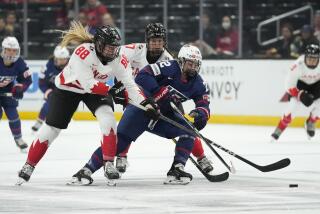Column: Chris Pronger’s new job with NHL has appearance of conflict

Chris Pronger being paid by the Philadelphia Flyers while he works for the NHL’s department of player safety could happen only in a league that seems to make up its rules as it goes.
This looks, smells, and quacks like a conflict of interest, even though he hasn’t played for the Flyers since 2011 because of an eye injury and concussion-related problems. Pronger, 40, remains on the Flyers’ long-term injured-reserve list and hasn’t officially retired because he gets paid and they get salary-cap relief as long as he maintains that status. If he retires, they’d take on his $4.94 million cap hit through the 2016-17 season.
Pronger won’t judge cases involving the Flyers, but he’s likely to weigh in on incidents involving their opponents, so he can influence whether a player is suspended before facing Philadelphia. Ron Hextall, the Flyers general manager, told reporters last weekend that he tried to clear the muddied waters and get Pronger off the team’s cap but was told by NHL Deputy Commissioner Bill Daly the collective bargaining agreement prohibited such a move.
Before Pronger’s hiring was announced, NHL Commissioner Gary Bettman said he foresaw no problem. “He’s done playing, and he gets paid no matter what, from the Flyers,” Bettman said. “He doesn’t owe them anything.”
But they owe him $5.15 million, and it’s fair to wonder whether that will cloud his judgment.
Yet, there are reasons this could work, including Pronger’s stubborn streak. It would be just like him to prove a point by scrupulously avoiding perceived or real conflicts. And he surely will bring valuable perspective as a player who was suspended eight times during a distinguished but often controversial career.
“He’s a guy who broke enough rules. He should know what the rules are and should be able to enforce ‘em,” Detroit Red Wings Coach Mike Babcock said last weekend. “He knew all the tricks, and he was mean, flat-out mean. It’s great for hockey and for Prongs.”
There are checks and balances in place, notably that Pronger is one voice in a group. Stephane Quintal, the senior vice president of player safety, has the final say in disciplinary decisions. This isn’t like former discipline czar Colin Campbell complaining about calls against his son, Gregory, who plays for the Bruins. Campbell was the boss; Pronger is an underling.
Ducks defenseman Francois Beauchemin said Pronger has credibility because of his experiences on both sides of the law. Beauchemin also noted that Brendan Shanahan, Quintal’s predecessor, was no angel on the ice.
“He knows how we think and how we play,” Beauchemin said of Pronger, his teammate on the 2007 Stanley Cup champion Ducks. “So these guys are able to make the right decision whenever they have to….You can’t cheat. They know what we’re doing.”
It looks bad that Pronger is being paid by a team while working for the NHL (and apparently contradicts Article 26 of its collective bargaining agreement with the NHL Players Assn.). It’s also shaky for the Flyers to be allowed to skirt the cap with a wink-wink, nudge-nudge agreement that Pronger won’t retire. What could redeem this is Pronger’s intelligence and resume, assets that merit allowing time to see if he can avoid favoring the hand that’s feeding him.
New owners, new story?
The Arizona Coyotes underwent an ownership change last week for the second time in a little more than a year, when Canadian businessmen Anthony LeBlanc and George Gosbee, who lead the IceArizona group and needed an American majority owner for tax benefits, sold 51% interest in the franchise to Philadelphia hedge-fund whiz Andrew Barroway.
What was Barroway thinking? Look at the math. LeBlanc and Gosbee paid $170 million to buy the franchise from the NHL. Barroway paid about $155 million for a 51% stake in a team whose losses reportedly topped $20 million last season and won’t make money this season. He must see future profits there, through growing league revenue, or somewhere else.
The immediate impact should be positive for the Coyotes. Part of Barroway’s initial investment will go into the franchise, perhaps boosting the payroll, and part as a return to shareholders.
The ownership change didn’t negate a clause in the existing agreement with the city of Glendale, Ariz., allowing the Coyotes to move if losses reach or exceed $50 million after five years. Stay tuned.
Slap shots
After making history last spring by squandering a 3-0 series lead over the Kings in the first round of the playoffs, the Sharks made the record books in a better light. They became the first NHL team to open the season with two shutouts by different goalies when Antti Niemi blanked the Kings, 4-0, on Wednesday and Alex Stalock beat the Winnipeg Jets, 3-0, on Saturday.
Last Saturday was only the sixth time in NHL history that all 30 teams played on the same day. It will happen again on April 11, 2015, the last day of the regular season….Winger Simon Gagne, invited to the Boston Bruins training camp on a tryout, is still practicing with them but hasn’t signed a contract. The Bruins (1-3) could use him but are in a salary-cap bind. Their cap was reduced by $4,779,500 this season, the amount that bonus payments put them over the cap last season….The 2016 NHL entry draft was awarded to Buffalo.
Twitter: @helenenothelen
More to Read
Go beyond the scoreboard
Get the latest on L.A.'s teams in the daily Sports Report newsletter.
You may occasionally receive promotional content from the Los Angeles Times.






